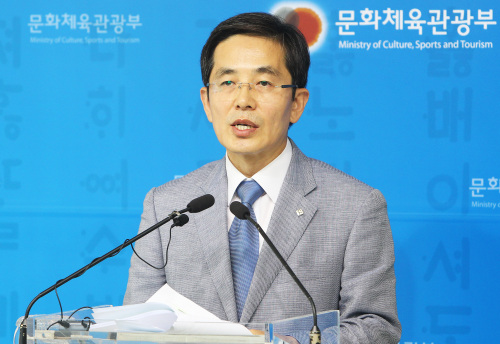The new chairman of the Korea Copyright Commission said on Monday that he will enhance copyright protection of Korean content overseas, especially as Korean pop music, TV dramas and animation are quickly spreading in cyberspace.
Yu Byong-han, who took office on Friday, said he will expand its overseas offices from the current three in Beijing, Shanghai and Bangkok to other destinations including Los Angeles and Vietnam to enhance monitoring of Korean copyright.
According to KCC data, about 80 percent of China’s 10 major portals and websites for music and video were providing Korean content illegally.
“We’ve just commissioned a report to a related organization, to find out in detail how Korean content is illegally copied and spread overseas. We’ll develop an index to measure it and the method will be out within the year,” Yu told reporters at a press conference in Seoul.
The quick spread of YouTube clips and advancement of cloud music services can be a double-edged sword for Korean copyright holders, as the Korean Wave is gaining popularity on the back of social networking sites and cloud-enabled smartphones.
 |
Yu Byong-han, chairman of the Korea Copyright Commission (Yonhap News) |
“Korea has to aim for both goals ― to introduce Korean content to the global market through various digital media but to protect the copyright of ‘high-quality content.’ So, Korea’s strategy should be two ways ― one is to provide free cultural content to introduce Korean content to the world and the other is to charge for ‘high-quality’ Korean content,” Yu said.
On how to respond to cloud-based services, Yu said the government has just started to look at the issue.
The KCC will also enhance cooperation with the World Intellectual Property Organization to designate KCC’s copyrights education center as a WIPO-certified center, he said.
The former culture ministry bureaucrat, who was in charge of cultural content and industry, expected that the Korea publication industry is likely to be hit by the Korea-EU free trade agreement that took effect from July, as the duration of author’s rights has been extended to 70 years from 50 years, with a two-year grace period.
As Korea pays more royalties for copyright to EU countries than it earns from them, the extension of the duration by 20 years is a loss to Korea. “With two years of grace period, the damage to the related industry will be minimized though,” Yu said.
By Kim Yoon-mi (
yoonmi@heraldcorp.com)








